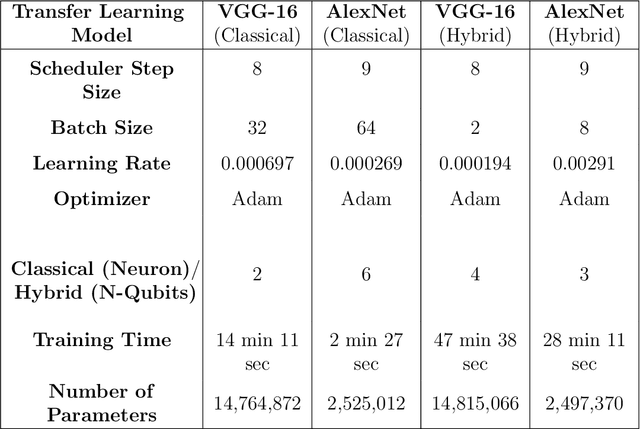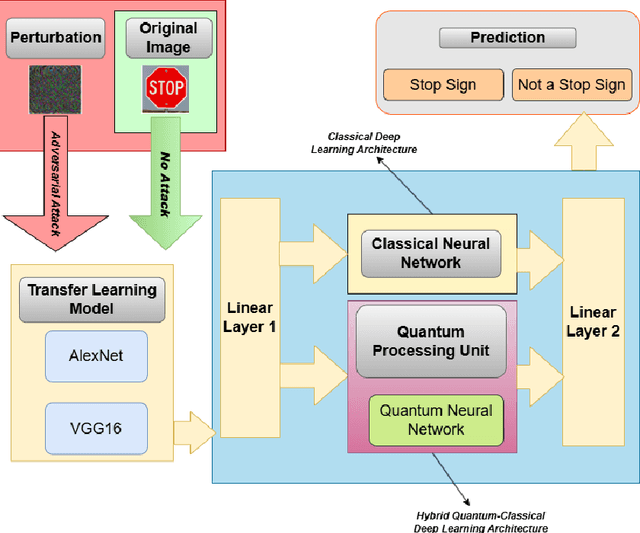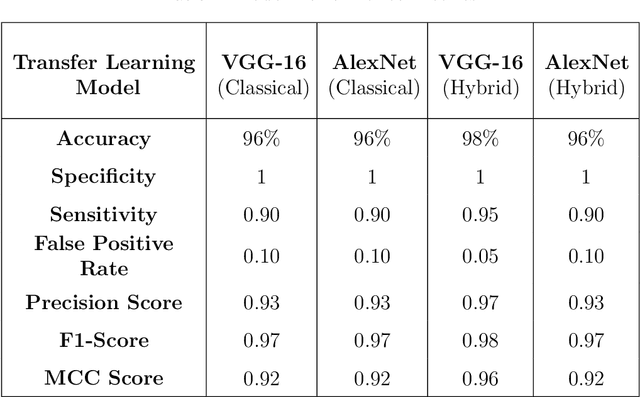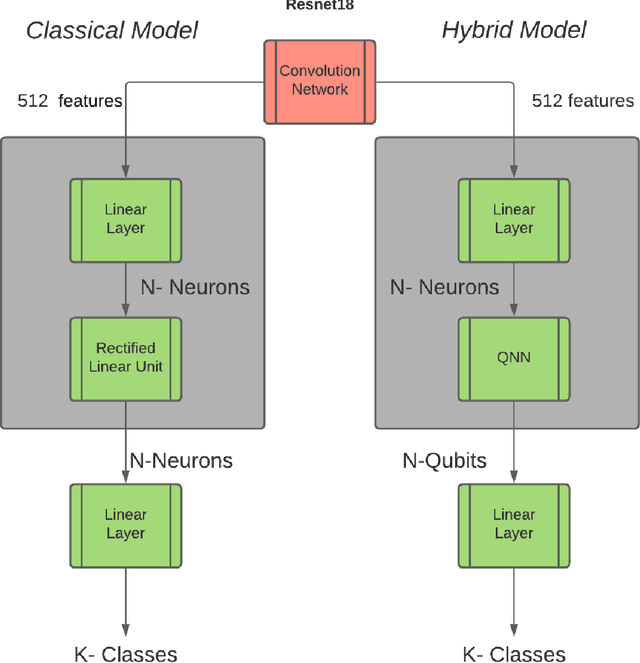Dimitra Michalaka
Quantum Computing Supported Adversarial Attack-Resilient Autonomous Vehicle Perception Module for Traffic Sign Classification
Apr 17, 2025



Abstract:Deep learning (DL)-based image classification models are essential for autonomous vehicle (AV) perception modules since incorrect categorization might have severe repercussions. Adversarial attacks are widely studied cyberattacks that can lead DL models to predict inaccurate output, such as incorrectly classified traffic signs by the perception module of an autonomous vehicle. In this study, we create and compare hybrid classical-quantum deep learning (HCQ-DL) models with classical deep learning (C-DL) models to demonstrate robustness against adversarial attacks for perception modules. Before feeding them into the quantum system, we used transfer learning models, alexnet and vgg-16, as feature extractors. We tested over 1000 quantum circuits in our HCQ-DL models for projected gradient descent (PGD), fast gradient sign attack (FGSA), and gradient attack (GA), which are three well-known untargeted adversarial approaches. We evaluated the performance of all models during adversarial attacks and no-attack scenarios. Our HCQ-DL models maintain accuracy above 95\% during a no-attack scenario and above 91\% for GA and FGSA attacks, which is higher than C-DL models. During the PGD attack, our alexnet-based HCQ-DL model maintained an accuracy of 85\% compared to C-DL models that achieved accuracies below 21\%. Our results highlight that the HCQ-DL models provide improved accuracy for traffic sign classification under adversarial settings compared to their classical counterparts.
Hybrid Quantum-Classical Neural Network for Incident Detection
Aug 02, 2021



Abstract:The efficiency and reliability of real-time incident detection models directly impact the affected corridors' traffic safety and operational conditions. The recent emergence of cloud-based quantum computing infrastructure and innovations in noisy intermediate-scale quantum devices have revealed a new era of quantum-enhanced algorithms that can be leveraged to improve real-time incident detection accuracy. In this research, a hybrid machine learning model, which includes classical and quantum machine learning (ML) models, is developed to identify incidents using the connected vehicle (CV) data. The incident detection performance of the hybrid model is evaluated against baseline classical ML models. The framework is evaluated using data from a microsimulation tool for different incident scenarios. The results indicate that a hybrid neural network containing a 4-qubit quantum layer outperforms all other baseline models when there is a lack of training data. We have created three datasets; DS-1 with sufficient training data, and DS-2 and DS-3 with insufficient training data. The hybrid model achieves a recall of 98.9%, 98.3%, and 96.6% for DS-1, DS-2, and DS-3, respectively. For DS-2 and DS-3, the average improvement in F2-score (measures model's performance to correctly identify incidents) achieved by the hybrid model is 1.9% and 7.8%, respectively, compared to the classical models. It shows that with insufficient data, which may be common for CVs, the hybrid ML model will perform better than the classical models. With the continuing improvements of quantum computing infrastructure, the quantum ML models could be a promising alternative for CV-related applications when the available data is insufficient.
Hybrid Classical-Quantum Deep Learning Models for Autonomous Vehicle Traffic Image Classification Under Adversarial Attack
Aug 02, 2021



Abstract:Image classification must work for autonomous vehicles (AV) operating on public roads, and actions performed based on image misclassification can have serious consequences. Traffic sign images can be misclassified by an adversarial attack on machine learning models used by AVs for traffic sign recognition. To make classification models resilient against adversarial attacks, we used a hybrid deep-learning model with both the quantum and classical layers. Our goal is to study the hybrid deep-learning architecture for classical-quantum transfer learning models to support the current era of intermediate-scale quantum technology. We have evaluated the impacts of various white box adversarial attacks on these hybrid models. The classical part of hybrid models includes a convolution network from the pre-trained Resnet18 model, which extracts informative features from a high dimensional LISA traffic sign image dataset. The output from the classical processor is processed further through the quantum layer, which is composed of various quantum gates and provides support to various quantum mechanical features like entanglement and superposition. We have tested multiple combinations of quantum circuits to provide better classification accuracy with decreasing training data and found better resiliency for our hybrid classical-quantum deep learning model during attacks compared to the classical-only machine learning models.
 Add to Chrome
Add to Chrome Add to Firefox
Add to Firefox Add to Edge
Add to Edge